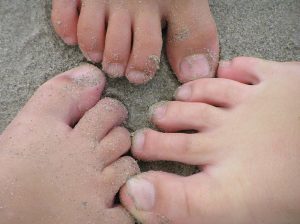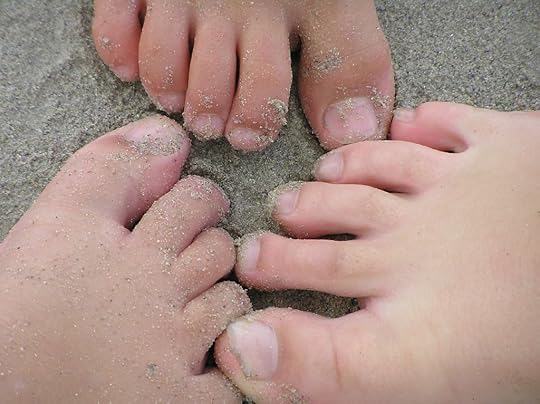Gary Neal Hansen's Blog, page 13
October 14, 2021
Asking Favors — A Children’s Sermon on Mark 10:35-45

 Two Boys Begging (CC by Greg Walters 2.0)
Two Boys Begging (CC by Greg Walters 2.0)My children’s sermon on Mark 10:35-45 has taken longer than I’d intended. It’s a complicated week.
The good news is that this week’s lectionary Gospel is one coherent story with some funny bits. (You can find my ‘Monday Meditation’ on the same passage here.)
At least they are funny to me. You never know with the Bible. Some people don’t think there are any funny bits. Others, like Thomas C. Willadsen, whom I met this summer at Synod School (sort of family camp for midwestern Presbyterians) see it every where.
You can check out his book on Amazon through this affiliate link–though be prepared for some cuss words.
It is possible, I think, to present both the funny parts and the more sober parts in kid-friendly ways.
My children’s sermon on Mark 10:35-45 ended up including one metaphor in the explanation that I put in Jesus’ mouth. Let me know whether you think kids would get the point in the discussion of dessert or not!
A Children’s Sermon on Mark 10:35-45Good morning kids! I’m so glad you’re here today. Thanks for coming up to hear the children’s sermon.
I wonder if you’ve ever wanted something really badly? I wonder if you’ve ever asked God to help you get what you wanted? I know I have.
Well, in the Bible, Jesus’ friends sometimes asked for things too. Let me tell you about one time when James and John really wanted something special.
Wanting somethingJames and John were brothers. One day they were talking about what they really really wanted.
James said “It’s kind of funny. I used to always think about what I wanted right here, and right now. You know—a new fishing boat, or a nice house.”
John said, “Me too! But, since we’ve been traveling around with Jesus, it seems like those things don’t matter as much to me.”
James said, “I know! Jesus helped me see that what really matters is the kingdom of God.”
John said, “Yeah. The kingdom of God is gonna totally last longer than a new boat.”
“Yeah,” James said, “like forever.”
Then they thought for a minute.
“So you know,” said James, “We really need to think about that. We need to make sure we have a good situation in heaven—like forever.”
“How are we gonna do that?” asked John.
“I know!” said James. “Let’s ask Jesus to work it out.”
Talking to JesusSo, James and John went up to Jesus.
“Can we talk to you for a minute?” John asked.
“Sure, guys,” said Jesus. “What do ya want to talk about?”
“It’s kind of private,” said John. “Could you maybe come over here with us?”
“Okay,” said Jesus, and the three of them left the other ten apostles and found a quiet spot to talk.
When they got there Jesus asked, “What’s up?”
“Um,” started James, “We wanted to ask you for something,”
“Sure. What were you going to ask for?” asked Jesus, “I’m always happy to hear what’s on your minds.”
Negotiations“Um…” started James, “John, maybe you should be the one to ask.”
James knew that John and Jesus were especially close friends.
“Okay,” said John. And he took a big deep breath and blew it out again. Suddenly he was kind of embarrassed to ask Jesus for help.
“Well, Jesus,” John said, “It’s like this. We want to ask you for something only you can really help us with.”
“Okay,” said Jesus. “What is it?”
“Well, first,” said John, “we need you to promise something.”
Jesus raised one of his eyebrows. “Oh?” he asked. “What do you want me to promise?”
“Before we tell you what we really want,” said John, “you need to promise that you’re going to do whatever we ask.”
Then he laughed. “Interesting,” said Jesus with a smile. “Tell me, guys, why would I make you a promise like that?”
James and John looked at each other. They seemed a little surprised by the question. Finally they shrugged their shoulders. “Because you like us?” they asked.
“Oh, I see,” said Jesus. “Well, yeah, I do like you. I really love you. But I’m not going to promise to do whatever you want even before you tell me what you’re going to ask.”
No Promises“Why not?” James asked.
“Think of it this way,” said Jesus. “Remember when you were little? Say your mom made a really special desert for a big family party. Would she let one of you eat the whole thing, all in one sitting?”
“No,” they said.
“What?” asked Jesus. “Not even if you asked really nicely?”
“No,” they said again.
“Why not?” Jesus asked,
“Um,” said John, “I guess it might not be good for us?”
“Yeah,” said James. “I think we might have gotten kind of sick to our stomachs.”
“Plus,” said John, “there wouldn’t be any left for the party.”
“Okay,” said Jesus. “Same reason. So, no promises. But tell me what you were wanting to ask me for.”
A Favor“Well,” said James, “We were hoping you could do us a little favor.”
“A favor,” said Jesus. “What kind of favor?”
“I think it should be pretty easy,” James said. “It’s kind of in the future. But—oh, you ask him, John, You’re better with words than me.”
“Okay,” said John. “We were thinking about heaven. You know. Like after we die? Well when you get set up in your big throne room, we want you to give us the best seats.”
“Yeah,” said James. “We want to be sitting right beside you. Like, I’ll be on your right, and John can be on your left.”
“No!” said John, “I want to be on his right. You can be on his left.”
“But you said—”
“Hold it, guys,” Jesus said. “Just wait a minute. I’m glad I didn’t make that promise. You see, I don’t get to decide who sits beside me in heaven. My father has that all worked out. But you know what I think?”
“What?” they asked.
Greatness“I think you guys just want to become something great,” Jesus said. “Well, there’s only one way to become great in the Kingdom of God.”
“What’s that?” John asked.
“Help other people,” Jesus said. “The greatest person of all is the one who’s the most helpful.”
“Hey,” said James, “It sounds like you want us to act like servants! I’m not sure I like that.”
“Well,” said Jesus, “that’s exactly how it works. Serve others. Do you still want to become great?”
WonderingI wonder if Jesus was surprised when James and John asked him to promise to do whatever they asked for?I wonder how James and John felt when Jesus wouldn’t promise to do whatever they asked?I wonder what you might do to help and serve other people this week? I wonder what it feels like to be great in that way?++++++++++++You are, of course, free to use this children’s sermon, or adapt it as you find most useful. But, if you use it, please do one (or more!) of the following.
You can let me know that you are using it, either in the comments below, or using the contact form above. You can put a little notice in your church bulletin that your children’s sermon is adapted from one published on GaryNealHansen.com.You can support my work over on Patreon. (Just $1 per month brings my children’s sermons straight to your inbox about two minutes after they go live. And every little bit keeps me going…)The post Asking Favors — A Children’s Sermon on Mark 10:35-45 appeared first on Gary Neal Hansen.
October 5, 2021
A Children’s Sermon on Mark 10:17-31

 Nano art: a camel through the eye of a needle (CC David Orban 2.0)
Nano art: a camel through the eye of a needle (CC David Orban 2.0)Writing this children’s sermon on Mark 10:17-31 was really interesting. Unlike so many lectionary selections, it hangs together as an exploration of a single theme. The challenge is that the theme is pretty grown up.
(You can see what I wrote about it for grown-ups in my Monday Meditation on this text here.)
I don’t mean it touches on anything that, as the Victorians might say “would cause the youth to blush.” Not at all.
It just seems to me that the “rich young ruler” (or simply, as here in Mark, “the man”) is dealing with issues that are pretty foreign to a kid’s world.
It has three discreet sub-scenes, so one can choose which to include and which to leave out.
First is the rich man seeking eternal life, but unwilling to let go of his stuff.Second we have Jesus’ words about how hard it is to enter the Kingdom.Third comes Jesus’ explanation to Peter that everything he gave up to follow Jesus will be more than paid back even here in this life.While it’s all on the topic of wealth and following Jesus, the last section sort of reverses course. I could either deal with the first part, or with the last part, but I’m not going to discuss both.
MethodHow do I write these children’s sermons, you may ask? Here’s how it worked this time.
I turned to God and ask what children most need to hear.
I meditated and studied the text, listening for hints as to how to communicate it to them.
Then I wrote with pen and paper, retelling the story, and retelling some parts over again. I listened for ways these brief exchanges could happen in a natural conversation, making one of the text’s points in an engaging way.
Then I started from scratch and wrote the children’s sermon on Mark 10:17-31 you see below
It’s a journey from what Barth famously called the “strange new world of the Bible” to what I’ll call “the “strange new world of a child’s consciousness.”
A Children’s Sermon on Mark 10:17-31Good morning, kids! I’m so glad you are here today. Thanks for coming up to hear the children’s sermon.
This morning’s Gospel reading had a story about a rich man who wanted to—
Well, just listen to the story. We’ll find out what that man wanted, and what he didn’t want.
A Man with a QuestionOne day Jesus and his friends were walking down the road. All of a sudden a man came running up to them.
“Jesus!” the man called “Jesus! I’ve been looking all over for you!”
The man was totally out of breath. He was bent over with his hands on his knees, huffing and puffing.
“Well,” said Jesus, “the good news is now you found me. What’s up?”
“I’m hoping… you can answer… my question,” the man panted. “Nobody else… could help me!”
“Okay,” said Jesus, “what’s your question?”
Eternal LifeBy now the man had caught his breath. As soon as he could stand up straight he got all the way down on the ground, right on his knees, in front of Jesus. He put his hands together are locked up to Jesus and said, “Please, please tell me how I can get eternal life!”
“Eternal life?” said Jesus. “You want to live forever? Just like God?”
“Yes!” said the man.
“Well, now,” said Jesus, stroking his beard, “why don’t you come along with me and I’ll show you?”
“Come with you?” he asked. “Where are you going?”
“Here and there,” said Jesus. “But who you’ll be with is way more important than where you’re going.”
“What, you mean these guys?” the man asked. “Who are they?”
“These are my disciples,” said Jesus. “They all decided to come with me too. That’s the important thing. You’ll be with me.”
“Um, I wasn’t really planing on going anywhere,” said the man. “I was hoping you could just tell me the rules – so I can live forever.”
“Ah, the rules,” said Jesus, sort of shaking his head. “Haven’t you read them in the Bible? Like don’t kill anyone, don’t steal, don’t say things that aren’t true—”
“Oh yeah,” said the man, “I know all the commandments. I’ve done that stuff my whole life. I just figured, maybe, there was something more.”
The Kingdom of Heaven“Ah,” said Jesus, “Something more. Well there is. ‘Eternal life’ is what everyone has in the Kingdom of God. It’s more than living forever. It’s being more alive than you’ve ever been before. If you want eternal life, you’ll need to come into the Kingdom of God. Are you ready?”
“Um, I don’t know.” said the man. “How do I, do that? How do I get into the kingdom of God?”
“Come along with me,” said Jesus. “You’ll be there for sure.”
“But—” said the man, “I can’t do that! What about my house? What about my business? I can’t just walk away from all my stuff!”
“Oh, we’ve got time,” said Jesus. “We’ll wait. You go back, and sell your stuff. Maybe you could give it all to the poor people in your village. Then come back and you can come along with me.”
“But that’s impossible!” said the man. “How can I possibly sell my stuff?”
A Camel and a Needle“Sure, it’s hard,” said Jesus. “It’s kind of like trying to get a camel through the eye of a needle:”
“Well of course!” said the man. “That’s completely impossible. No one can get a camel through the eye of a needle!”
“Sure,” said Jesus. “You can’t do it. But God can do it. God can do anything.”
“How can God get a camel through the eye of a needle?” he asked.
“Maybe he’ll start with a really big needle,” said Jesus. “Or maybe he’ll take all the baggage off the camel. Or maybe—”
“What?” asked the man.
“Well,” said Jesus, “to tell you the truth, sometimes God just likes to do impossible things.”
“Let me think about it,” said the man as he walked away.
“Good idea,” said Jesus.
Then he turned to his friends and said, “I hope he comes back. I really like that guy.”
WonderingI wonder how that man felt when Jesus invited him to come along on his travels?I wonder how he felt when Jesus said he needed to leave his belongings behind?I wonder if the man ever decided come along with Jesus?I wonder if you would like to travel with Jesus and be with him?++++++++++++You are, of course, free to use this children’s sermon, or adapt it as you find most useful. But, if you use it, please do one (or more!) of the following.
You can let me know that you are using it, either in the comments below, or using the contact form above. You can put a little notice in your church bulletin that your children’s sermon is adapted from one published on GaryNealHansen.com.You can support my work over on Patreon. (Just $1 per month brings my children’s sermons straight to your inbox about two minutes after they go live. And every little bit keeps me going…)The post A Children’s Sermon on Mark 10:17-31 appeared first on Gary Neal Hansen.
September 29, 2021
A Children’s Sermon on Mark 10:2-16 — Jesus Loves Children

 Red Rover (CC by Max Talbot-Minkin 2.0)
Red Rover (CC by Max Talbot-Minkin 2.0)Somebody is going to accuse me of wimping out in my children’s sermon on Mark 10:2-16. I’m skipping all the hard stuff and dealing only with the easy part. (You can see my regular Monday Meditation on this passage, which is mostly on the divorce stuff, by clicking here.)
I’m skipping Jesus’ public conversation with the Pharisees where he seems to forbid divorce (Mark 10:2-9).I’m also skipping Jesus’ private conversation with his disciples where he seems to double down on the divorce issue (Mark 10:10- 12).Instead I’m going to talk with the kids about the part of the story with kids in it. (Mark 10:13-16). Focusing on KidsIf you stop by here regularly you will have, I hope, expected that. Often the lectionary gives Gospel readings with two or three distinct sections—multiple encounters or multiple parables. If one part of the reading includes reference to a child, even if the child is offstage the whole time and just being talked about, that’s the piece I tend to focus on.
Why? Because I’m preaching to kids, and I want them to know that the Good News of Jesus is actually for them.
And I tell you, in most churches, not a single person in the 12 and under set is even married, much less pondering divorce.
“Aha!” you say, “But some of them have parents who have gotten a divorce! That makes the hard stuff here relevant.”
True enough. But for a child of divorce, are these really the passages to talk about? Will these words help them as they try to make sense of their parents’ broken marriages?
Taken at face value, Jesus’ words will lead them to judge their parents, or to be even more worried about them than before.
Hansen’s Rule of DiscernmentThis illustrates an important principle of biblical interpretation. Let’s call it “Hansen’s rule of discernment.” It goes like this:
Yes, as Paul said, all Scripture is inspired by God and is useful.But, some passages are for today, and some are for tomorrow.Think hard about whether your little kids need a clear rule on divorce today. I’d say they’ll need that some time in the future.
If you are choosing the passage to be read in the service, you can use your discernment to choose something totally on target. But if your church uses the lectionary, you have to discern what part of that passage brings the Word God is speaking today.
Especially for kids. Like in a children’s sermon on Mark 10:2-16.
Plus, kids dig the story of Jesus welcoming the children. Lord knows some adults in a couple churches out there could benefit from its lesson.
When my own kids were smaller, sometimes I let my kids pick the Bible story I would tell at bed time.
My daughter always chose this one.
My son? He always went were for David and Goliath. Go figure.
(By the way: I think a key to actually using this one is exaggerating Peter’s emotions.)
A Children’s Sermon on Mark 10:2-16Good morning kids! I’m so glad you’re here today. Thanks for coming up to hear the children’s sermon.
There is something very special about the Gospel story we read in church this morning. You’ve heard stories about Jesus healing children when they were sick. Well this story is about Jesus hanging out with some kids when they were just being kids.
Very Serious MattersOne day Jesus had been talking to the grown ups about Very Serious Matters.
Some picky judgey people came to start an argument with him.
Then his disciples came to ask him about hard, confusing things.
Jesus found it all kind of exhausting. So he decided to take a break and go for a walk.
But then his disciples decided to come along. They wanted to ask him more hard questions to solve all their confusing problems. So Jesus was surrounded by disciples asking Serious Difficult Questions.
Kids and their ParentsBut then there was a sound from down the road, back toward the village. It sounded like children, laughing and yelling.
Jesus couldn’t see, with all those serious grown up disciples around him, but there was a small crowd coming up the road. It was a whole bunch of kids and their parents.
The parents wanted to bring their kids so Jesus would put his hands on their heads and bless them.
But the kids wanted to go see Jesus because they knew Jesus was a lot of fun to be with.
Well, Jesus couldn’t see, but he could hear them. The kids were standing in a line holding hands. They yelled “Red Rover, Red Rover, send Jesus on over!”
Time to Stop That!Some of the disciples decided it was time to do something.
Peter turned around and looked at the group of people who had just arrived.
Actually he looked straight over the heads of the kids so he could look at their parents.
“You people are making too much noise!” Peter said. “You should go away.”
The kids shouted “Red Rover, Red Rover, send Jesus on over!”
“Shush!” said Peter. “I’m talking to these grownups. Your parents.”
But the kids laughed and shouted again, “Red Rover, Red Rover, send Jesus on over!”
“Shush!” said Peter again. “You parents! Make your children be quiet. Jesus is very busy. Jesus is doing Important Grown Up Things. The adults are trying to talk.”
But the kids kept shouting “Red Rover, Red Rover, send Jesus on over!”
Peter, I must say, was getting very red in the face, “Shush!” he said again. “Didn’t you hear—“
Time to Stop Peter!But just then Jesus tapped Peter on the shoulder, “Hey Pete,” Jesus asked, “what are you doing?”
“I’m sending these children away.” Peter said, “I told them you are busy doing important grown up things.”
“Oh Peter,” Jesus said, shaking his head. “Just stop that. I want the kids to come to me. And kids are important. The whole kingdom of heaven belongs to them.”
“It does?” asked Peter.
“It does,” said Jesus. “Plus, they’re a lot more fun than you. Did I hear someone say Red Rover? I love Red Rover!”
Time to Play!And with that Jesus broke through the line of disciples, and ran into the arms of the kids. They all went to the grassy field beside the road and played for the rest of the afternoon, running, and wrestling, and playing games.
And when it was time for the kids to go home to dinner, Jesus hugged each one, and prayed for each one, and gave each one a special blessing.
WonderingI wonder what it felt like when the disciples wouldn’t let the children come to Jesus?I wonder what it felt like when Jesus said the children could come to him after all?I wonder what it means that the Kingdom of heaven belongs to children?I wonder what games you would want to play with Jesus if he came to your neighborhood?++++++++++++You are, of course, free to use this children’s sermon, or adapt it as you find most useful. But, if you use it, please do one (or more!) of the following.
You can let me know that you are using it, either in the comments below, or using the contact form above. You can put a little notice in your church bulletin that your children’s sermon is adapted from one published on GaryNealHansen.com.You can support my work over on Patreon. (Just $1 per month brings my children’s sermons straight to your inbox about two minutes after they go live. And every little bit keeps me going…)The post A Children’s Sermon on Mark 10:2-16 — Jesus Loves Children appeared first on Gary Neal Hansen.
September 21, 2021
A Children’s Sermon on Mark 9:38-50 — Self-Harm?

 Kids’ Feet on Fish Hoek Beach (CC by MyAngelG 2.0)
Kids’ Feet on Fish Hoek Beach (CC by MyAngelG 2.0)Writing a children’s sermon on Mark 9:38-50 presents both a very typical challenge and a more unusual one. (If you want to see my regular “Monday Meditation” on this passage, you can find it here.)
As is pretty typical, the lectionary gives us a chunk of text with several almost unrelated scenes or teachings. That makes it hard to do a coherent children’s sermon on the passage as a whole.
I’ll have to choose one part, despite the fact that every bit I skip could itself be the heart of another excellent children’s sermon.
The less typical thing here is that all four component parts (or three depending on how you count them) are really challenging to present to kids—or grownups, for that matter.
There’s the case of the disciples complaining about a non-disciple casting out demons in Jesus’ name. Then there’s the attached tiny lesson about God rewarding people for being nice to Christians.Of course there’s the scary section where Jesus seems open to self-mutilation to prevent sin.Finally, there’s the ambiguous ending about salt, a naturally occurring mineral, becoming un-salty. Clearly a metaphor, but… what?Sure, there are good grown-up sermons waiting in all of these parts. But how to build even one part of this into a children’s sermon on Mark 9: 38-50?
I could take the easy path, and jump to the OT lesson for today.
But no: by golly, I’m going to do this according to plan.
I’m going to jump right into the hardest bit and write a children’s sermon on Mark 9:38-50. I think that the scary story in the middle would be what sticks in the mind of any kid who hears the passage read in the service, so it seems wise to explore it in a kid-friendly way.
A Children’s Sermon on Mark 9:38-50Hey, good morning kids! I’m so glad you are here today. Thanks for coming up to hear the children’s sermon.
I’m wondering if you like scary stories.
Some people really do. They go to scary movies, they read scary books, they tell scary stories around the campfire or on sleepovers. Some people love scary stories.
Other people really don’t like scary stories at all. If a TV show gets too scary they’ll cover their head with a pillow, or run straight out of the room. If a story is even a little bit scary, some people become totally miserable. They can’t even sleep at night after a scary story.
Well, one time, Jesus told his friends a scary story.
Don’t worry: I’m not going to tell the story. You might not like scary stories, and I don’t want you to be scared. Instead we’ll listen in while the disciples talk about the story, and hopefully that won’t be so scary.
So here’s what I imagine might have happened after Jesus told his friends that story.
After the Scary StorySome of Jesus’ friends were laughing and laughing, retelling parts of the story to each other.
“That totally gave me goose bumps!” said Peter. “Can you imagine? That guy came hopping in on his one foot, and he couldn’t pick stuff up because his hand was gone!”
“Oh man!” laughed Nathaniel. “That was so scary!”
They laughed and laughed.
But some of the other disciples weren’t laughing at all. They were looking down at their sandy feet and frowning.
“What’s the matter, you guys?” asked Jesus. “John? Mary? You look so sad.”
“I’m afraid I won’t be able to sleep tonight!” said Mary. “I’m just so scared after that story.”
“Yeah,” said John, “why did you tell such a scary story anyway?”
“I’m sorry I scared you,” said Jesus. “You know, that story was actually supposed to be kind of silly.”
Scary or Silly?“Silly?” said Mary. “But the guy in the story cut off his hand and his foot! And he poked his own eye out!”
“I know, right?” said John. “It was totally gross to think about that. I’m still kind of creeped out.”
“You said he was trying to make sure he didn’t do bad stuff,” said Mary. “He didn’t want to go bad places so he cut off his foot. And he didn’t want to do bad stuff with his hand so he cut that off too! Is that what you really want people to do?”
“Yeah,” said John, “I don’t want to do bad stuff, but that just sounds—crazy!”
“You’re right,” said Jesus. “It does sound crazy. So crazy it was supposed to sound silly.”
“What do you mean?” asked Mary.
“Remember,” said Jesus, “in the story that guy thought his foot was making him go bad places. He thought his hand was making him do bad things. He thought his eye was making him look at stuff that he wasn’t supposed to look at. But is that really how it works?”
“I don’t know,” said John.
What Part of You Does Bad Things?“Think about it,” said Jesus. “Say you see a big sign on a door that says ‘Warning! Do not enter! Danger!’ Then imagine that you walk in any way. Was that your feet’s fault?”
“No” they said.
“Well then why cut off your foot?”
“Well if it’s not my foot’s fault, or my hand’s fault, or my eye’s fault, what part of me makes me do bad stuff?”
“I wonder,” said Jesus.
“So,” said Mary, “You don’t want us to hurt our bodies?”
“No,” said Jesus. “Never. You are made in the image of God. You should never harm someone God loves so much.”
“But what about in the story?” said John. “That guy ended up with only one foot, and one hand, and one eye.”
“Well,” said Jesus, “I wish that guy had looked inside and figured out what really made him do bad stuff.”
WonderingI wonder what really causes us to do things we know are wrong.I wonder how Jesus might help us heal the sad and broken places inside us.I wonder if you’ve ever been tempted to hurt someone God loves.I wonder if you’ve ever thought about how much God loves every single part of you.++++++++++++You are, of course, free to use this children’s sermon, or adapt it as you find most useful. But, if you use it, please do one (or more!) of the following.
You can let me know that you are using it, either in the comments below, or using the contact form above. You can put a little notice in your church bulletin that your children’s sermon is adapted from one published on GaryNealHansen.com.You can support my work over on Patreon. (Just $1 per month brings my children’s sermons straight to your inbox about two minutes after they go live. And every little bit keeps me going…)The post A Children’s Sermon on Mark 9:38-50 — Self-Harm? appeared first on Gary Neal Hansen.
September 13, 2021
A Children’s Sermon on Mark 9:30-37

 Jesus Blessing Little Children (Public Domain) (And kinda hokey)
Jesus Blessing Little Children (Public Domain) (And kinda hokey)This week I’m writing a children’s sermon on Mark 9:30-37. That’s the Gospel assigned for “Proper 20 (25)” in “Year B” of the Revised Common Lectionary. (You can find my regular meditation on the same text here.)
It’s a pretty straightforward story to work with.
Yeah, you’ve never heard me start out that way before.
Each week I start by pointing out what I see as most challenging about presenting the assigned Gospel text.
Maybe you’ve wondered “Why is he complaining about this? Nobody asked him to write these things!”
Well, true enough. But there is a reason: I really would like people to take this process more seriously. I suspect that a great many children’s sermons are presented with precisely zero preparation.
Faithfulness to our calling requires more. I want people to take children’s sermons seriously as preaching—just as seriously as when they will be preaching to grown ups.
I’d argue that preaching to kids is in some ways more challenging than preaching to grown-ups. I mean you, the preacher, are a grown-up. You are not a child (even if you can be childish).
So preaching to children requires cross-cultural communication. It is quite explicitly a missional enterprise.
So, shame on us if we step out there for the children’s sermon with no preparation.
And shame on the churches who delegate the children’s sermon to someone without any of the confidence and perspective that comes from theological training.
But you, dear reader, are not like that. You want to show Christ’s love to small people, and to invite them into a life of faith, drawing them deeply into the stories the Bible tells about Jesus. Good for you.
You are the kind of person who wants a a solid children’s sermon on Mark 9:30-37.
Let’s do this. It’s straightforward, like I said. If there’s a challenge, it’s making all three parts of the story feel like one coherent message. But here we go with a children’s sermon on Mark 9:30-37.
A Children’s Sermon on Mark 9:30-37Hello kids! I’m so glad you are here today. Thanks for coming up to hear the children’s sermon.
One time, Jesus and his friends were walking along the road. They had been teaching, and healing people, and helping people all through the towns of Galilee.
“Oh man!” said Peter, “I’m so glad we’re finally heading home! I can’t wait to get back to Capernaum.”
“Me too,” said Jesus. “It’s been a good trip though.”
“Hey Jesus!” said John, “I think there’s another village coming up. Do you want me to run ahead and tell them that we’re coming?”
“Thanks, John,” said Jesus, “but no. We’re going to skip that one for today. I really don’t want anybody to know I’m here.”
“How come?” John asked.
“I have something very important to talk with you all about. Come on!” he called out, “everybody come closer so you can here.”
Well it took a couple minutes to get everybody organized. Then they started walking again, and Jesus started falling.
“I want to make sure all of you understand what’s going to be happening,” he said. “We’re going to head up to Jerusalem soon. And then it’s going to get kind of scary. They are going to arrest me. A bunch of people are going to start accusing me of doing bad things.”
“What did you do?” asked Nathaniel. “Was it something really bad?”
“I didn’t do anything wrong, Nathaniel,” Jesus said. “But they are going to make accusations. Then soldiers are going to beat me and hurt me. And eventually they are going to kill me. But that won’t be the end. I’m going to come back alive again.”
A Really Dumb ArgumentWell, by this time the disciples were sort of drifting away down the road.
“Didn’t Jesus already tell us this?” asked John.
“Yeah,” said Mary. “A couple times actually.”
“I told him to stop of the other day,” said Peter.
“Yeah, I heard that,” said Nathaniel. “I’m thinking that didn’t go so well for you.” And he started laughing at Peter.
“Hey!” said Peter. “What gives you the right to laugh at me? Everybody knows I’m the Most Important Disciple! Jesus likes me best.”
“Biggest Mouthed Disciple is more like it,” Nathaniel said.
“Well Jesus said I’m the rock,” Peter said. “He said he’s gonna build the whole church on the base of my faith.”
Peter looked pretty smug when he said that.
“Oh yeah?” said Nathaniel, kind of sneering. “Well Jesus said I’m an Israelite with no guile!”
“What’s that mean?” John asked Mary.
“It means he says whatever comes into his head, even of it’s kind of dumb,” said Mary.
“No,” said Nathaniel, “It means I’m the Most Important Disciple. Jesus likes me best.”
“Um, no,” said John, “I don’t think so. Everybody says I’m the disciple Jesus really loves. That makes me the Most Important Disciple.”
“Hey you guys,” said Mary, “Don’t forget how Jesus said I was the one who made the very best choice. Remember? It was that night when we had dinner at my house and I sat at his feet to listen and learn. I’d say that makes me the Most Important Disciple. Plus, he always comes over to my house!”
“More important than your sister Martha maybe,” said Peter, “but not most important of all.”
Caught in the ActWell, I’ll spare you the rest of the argument. They bickered about it all the way back to Jesus’ house in Capernaum.
Once they were finally inside, Jesus said, “So what were you all talking about back there?”
Peter, John, Nathaniel, and Mary all sort of looked down at their feet, or up to the ceiling. Not at Jesus.
“Oh, nothing,” somebody mumbled.
“Okay, well that’s good.” Jesus said. “Hey I wanted to tell you all something really important.”
“We know, we know,” moaned Nathaniel. “You’re gong to get arrested, and hurt, and killed—”
“No, not that,” said Jesus. “I already told you about that. No, I wanted to tell you who I think is the Most Important Disciple.”
They all sort of looked up.
John smiled. “You mean the one you like best?”
“Well,” said Jesus, “I wasn’t going to put it quite like that. But here’s the deal: If you want to be the Very Most Important Disciple, you have to be more helpful than everybody else. Like, take the jobs a servant would do. Clean up after the others. Wash people’s feet when they need it. And other stuff.”
“Yuck” said Nathaniel.
“I was right about you, Nathaniel,” said Jesus. “No guile.”
The Neighbor KidJust then a little girl came running in. She lived next door and she just loved playing with Jesus.
“Jesus!” she cried, “You’re back!” And she threw herself into his arms and gave him a big hug. “I missed you so much!” she said. “Don’t ever go away again.”
Peter said, “Um, little girl? We’re talking about grown up things here and I think maybe you should head back home.”
But Jesus just hugged the girl and then turned her around so everyone could see her.
“Listen up everybody. Here’s an example of doing what’s really helpful. Say you welcome one little kid because you know that kid belongs to me. Well then really you’ll be welcoming me. And if you welcome me then really you’re welcoming my father—God.”
Then he said to the little girl, “Let’s go play.”
And they did.
WonderingI wonder why Jesus kept telling his friends about the hard things that were coming?I wonder if you’ve ever argued with someone about who is the best, or who is most important?I wonder what kinds of things you might do to help people, or serve others? I wonder if someone ever welcomed you in a way that made Jesus feel welcome too?++++++++++++
You are, of course, free to use this children’s sermon, or adapt it as you find most useful. But, if you use it, please do one (or more!) of the following.
You can let me know that you are using it, either in the comments below, or using the contact form above. You can put a little notice in your church bulletin that your children’s sermon is adapted from one published on GaryNealHansen.com.You can support my work over on Patreon. (Just $1 per month brings my children’s sermons straight to your inbox about two minutes after they go live. And every little bit keeps me going…)The post A Children’s Sermon on Mark 9:30-37 appeared first on Gary Neal Hansen.
September 9, 2021
Julian of Norwich “Showings” — The New Book in My Zoom Group

 Julian of Norwich on AmazonMy Zoom Book Group
Julian of Norwich on AmazonMy Zoom Book GroupBefore the pandemic I started a Patreon page, and the most popular thing I did there was labeled “The Education.” For $8.33 per month (that comes out to $100 per year) you get access to an ongoing series of videos that take you into a topic or text from the history of Christianity and it’s theological riches.
Some were pastors who missed seminary-level input.
Some were not pastors, but really valued access to seminary-level input.
Then came COVID and lockdowns. Life was isolated. I put out an invitation to the participants: Why not have live weekly discussions of the current book or topic via Zoom?
We tried it. We liked it. We still do it.
Every time we start a new book I open it up to new participants.
That’s happening again–most likely next week. We meet on Fridays, 4:00 to 5:00 Eastern time. People come from other time zones. Turns out it’s Saturday morning if you live in New Zealand.
Julian of NorwichSo what’s the book, you ask?
It’s Julian of Norwich’s “Showings,” also known as “Revelations of Divine Love.”
Julian was an “anchoress,” sort of like a nun who lived in seclusion connected with a church in Norwich England in the 14th century. So you get some interesting windows into the history of what Christian devotion looked like in the Middle Ages.
Most famously, she had a series of visions, encounters with Jesus, which she meditated on for the rest of her life. So you get windows into Christian mysticism, and you get some remarkable theological reflections.
The book is wildly different from most anything written today. Not everyone will love it. That’s okay. It will stretch you, and it may well inspire you. Julian was amazing.
We’ll be reading the Penguin edition, translated by Spearing and Spearing. You can get it on Amazon through this affiliate link. (This is to the US store. You may need to switch stores, or hunt it up on the site of your choice if you are outside the USA.)
It’s really fun. We’ve come to really care for and support each other. We would love to have you in the group.
Just click on over to Patreon to sign up if you are interested.
++++++++++++
This post contains affiliate links.
The post Julian of Norwich “Showings” — The New Book in My Zoom Group appeared first on Gary Neal Hansen.
September 7, 2021
A Children’s Sermon on Mark 8:27-38 — Being Mad and Still Loving

 Scream and Shout (cc by Mindaugas Danys 2.0)
Scream and Shout (cc by Mindaugas Danys 2.0)I found it more than usually challenging to find a good place to dig in for a children’s sermon on Mark 8:27-38.
That’s the lectionary Gospel for Proper 19(24) in Year B. (You can find my regular meditation on it here.)
It consists of three interrelated scenes, each with its own problems:
1. On a walk, Jesus asks the disciples who people say he is.
The discussion of Jesus’ identity is a bit more interesting in Matthew’s version.
2. Jesus predicts his passion, leading Peter to rebuke Jesus, leading Jesus to rebuke Peter.
The passion prediction will come up again, and is potentially a bit scary.
3. Jesus presents the paradoxes of discipleship.
The third is conceptually challenging, I’d say, in terms of communicating with kids.
But maybe there is a nugget to work with in Peter and Jesus rebuking each other…
People get mad at each other. They still can love each other. It all depends on what they do with their mad feelings.
It reminds me of a famous song by Mr. Rogers.
Let’s see where that takes my children’s sermon on Mark 8:27-38.
A Children’s Sermon on Mark 8:27-38Good morning kids! I’m so glad you are here today. Thanks for coming up for the children’s sermon.
Sometimes I think we get the wrong pictures on our heads about what Jesus is like and what it was like to be one of his first good friends.
I know that I do. I love Jesus, and I know he loves me. So I sometimes imagine that being with him way back in Bible times was always peaceful and happy.
But you know, sometimes even when we are with the people we love the most, we get into arguments.
Brothers and sisters get into fights.Kids and their parents sometimes yell at each other,And sometimes moms and dads who love each other get really mad at each other.If someone tells you that you did something totally wrong, it can feel like they are mad at you.
When someone gets mad at you, it can feel really terrible. Especially if they call you names.
But here’s the truth: just because two people have an argument, that doesn’t mean they don’t love each other any more.
Jesus Predicts Hard Times Will ComeLet me tell you how I know this. One day Jesus and his friends were talking.
“Hey you guys,” Jesus said, “there’s some stuff coming up that you really need to know about. Listen carefully. We’re going to go up to Jerusalem. then I’m going to get arrested. People are going to do really mean things to me. They are going to hurt my body. And then—”
Peter InterruptsJust then Peter interrupted.
“Um, Jesus,” Peter said, “just a minute. You and I need to talk.”
Jesus said, “Can’t it wait Pete? I’m kind of in the middle of something important. Now as I was saying, after they arrest me and hurt my body, they are actually going to kill me. And then—”
But then Peter interrupted again.
“Look, Jesus,” he said, “I said we need to talk. Right now!”
And he grabbed Jesus by the arm and pulled him away from the others.
“Okay Peter,” said Jesus, “what’s up?”
A Big Argument“Here’s the deal,” said Peter. “You shouldn’t be talking about all this scary stuff. You say you are going to get arrested and hurt, even killed. That’s just not okay! John and Mary are going to be totally freaked out. Thomas will probably lose his faith in you. And who knows what Judas will do! You’ve got to stop it.”
“Wow!” said Jesus, “It sounds like you’r pretty upset.”
“Darn right I’m upset!” said Peter. “I’m mad at you. Plus it’s not gonna even happen. We would never let all that bad stuff happen to you!”
“Well Peter, I’m mad at you too.” Jesus said.
“Me?” asked Peter. “Why are you mad at me?”
“Because,” said Jesus, “you’re trying to stop me from doing what God wants me to do. You aren’t acting like my friend. You’re acting like my enemy. Yeah, you’re like Satan!”
“Satan!” said Peter. “That’s a mean name! You hurt my feelings!”
“Peter,” said Jesus, “you can’t stop me from doing what I’m supposed to do. I’m telling you all about the hard things that are going to happen. I want you to be ready, so you won’t be surprised. I want to keep you from being too scared.”
“So all that stuff is really going to happen?” asked Peter.
“That’s right,” Jesus said. “I know its confusing now. But this is how I’m going to help the whole world.”
Still FriendsSo Peter was mad at Jesus. Peter told Jesus he was totally wrong.
And Jesus was mad at Peter. He even called Peter “Satan”!
But you know what? Jesus and Peter still really loved each other. They were still really good friends.
WonderingI wonder if you’ve ever been really mad at someone you love? I wonder if someone you really love has ever been mad at you? I wonder if you’ve ever done like Peter and told God that he was totally wrong about something?I wonder if God ever might tell you that you are totally wrong about something?++++++++++++
You are, of course, free to use this children’s sermon, or adapt it as you find most useful. But, if you use it, please do one (or more!) of the following.
You can let me know that you are using it, either in the comments below, or using the contact form above. You can put a little notice in your church bulletin that your children’s sermon is adapted from one published on GaryNealHansen.com.You can support my work over on Patreon. (Just $1 per month brings my children’s sermons straight to your inbox about two minutes after they go live. And every little bit keeps me going…)The post A Children’s Sermon on Mark 8:27-38 — Being Mad and Still Loving appeared first on Gary Neal Hansen.
August 30, 2021
A Children’s Sermon on Mark 7:24-37 — Loving People Different from You

 Waiting Under the Table (CC by darwin Bell 2.0)
Waiting Under the Table (CC by darwin Bell 2.0)Writing a children’s sermon on Mark 7:24-37 present both ordinary challenges and unusual ones.
(You can find my regular Monday Meditation on this passage here.)
On the ordinary side, a children’s sermon on Mark 7:24-37 has to decide what to do with two separate stories. I’m a firm believer that a children’s sermon needs to focus on one thing from the passage. This is one of those lectionary readings that includes two distinct healings in two distract settings.
The unusual challenges come with the contents of the stories.
Story 1Story#l is “The Syrophoenician Woman” who came to ask Jesus to heal her daughter.
You might think the challenge would be explaining the term “Syrophoenician,” but no! Instead I have to work around Jesus’ apparent rudeness to her. He basically called her a dog.
Story 2Story#2 is the healing of a man who is both deaf and unable to speak. This one may seem perfectly fine to you, if you have spent most of your life able to hear. However if you are Deaf (that is, not only severely hearing-impaired, but closely connected to the community of people who do not hear) you may well find this one problematic.
Today, people in the Deaf community find love, acceptance, and life by staying connected with each other. To some members of the Deaf community, an offer of fully-functional hearing doesn’t come across as an offer of healing. It’s more like a threat that you’ll lose your friends, family, and place in the world. (Or so I’ve been told. I’m not Deaf, so what do I know?)
And the winner is…As I did in another text recently, I’m making the choice with a simple strategy: Choose the text with a kid in it–even if the kid is offstage the whole time. I’m talking to kids, so that should help them relate.
So… my children’s sermon on Mark 7:24-37 will be on the Syrophoenician Woman.
A children’s sermon on Mark 7:24-37Good morning kids! I’m so glad you are here in worship today. Thanks for coming up for the children’s sermon.
I don’t know if you know this, but Jesus was Jewish. Maybe you know some Jewish people. Maybe you don’t.
The Jews are the people you meet in the Bible’s Old Testament. A long time before Jesus, they were enslaved in Egypt. God used Moses to set them free. God brought them to freedom in a different land. God gave them the Ten Commandments and other instructions on how to live as God’s beloved people.
So Jesus was born a Jew. And all twelve of his apostles were Jews. And most of the time he taught and healed and helped people in the region known as Judea where the Jewish people lived.
A trip to the countryBut one day Jesus said, “Hey guys! Let’s go up north and visit Tyre and Sidon.”
Peter spoke up, of course. “Um, Jesus, I don’t think that’s a good idea.”
“What’s the problem, Peter?” asked Jesus.
“Well, its a long walk for one thing,” Peter said. “My feet get tired. Dusty roads… Hot sun… Blisters from my sandals…”
“Hm…” said Jesus. “Is that really what’s bothering you?”
“Not exactly,” said Peter, looking down at his feet. He looked a little embarrassed, actually.
“So why don’t you want to go to Tyre and Sidon?” Jesus asked.
“Well, I, um,” Peter sputtered, “I think we should maybe just stay right around here. Yeah, like, in Judea.”
“Why’s that?” Jesus asked gently.
“Because—” said Peter, “well, because you’re, like, the Messiah, right? For the Jews. I mean, you should stay here and take care of our kind of people.”
“Oh,” said Jesus, “I see.” He sounded kind of sad.
Then Simon the Zealot spoke up. “I don’t want to go to Tyre and Sidon either,” he said. “Those people in Tyre—those are bad people.”
“Bad people?” asked Jesus. “What do you mean?”
“They’re foreigners,” Simon Zealot said. “They don’t keep God’s laws like we do. My mom and dad said they’re like filthy dogs. But here in Judea your helping the children of God!”
“I see,” said Jesus. “You want me to feed and heal and help you and your neighbors, but you don’t want me to even visit foreign people.”
“That’s right!” said Peter and Simon Zealot at the same time.
“Well here’s the deal, my friends,” Jesus said. “I’m not just the Messiah for the Jews. I’m the Messiah for everybody.”
Then Jesus stood up. “Let’s take a walk,” he said. “Next stop: Tyre and Sidon.”
A long walkWell, it was a really long walk. It took them a couple of days to get to Tyre.
(See map four through this link if you want a sense of perspective.)
One after another the disciples kept asking, in really whiny voices, “Are we there yet?”
Now and then someone would grumble “I don’t see why we have to go to Tyre and Sidon. Why do we have to go to Tyre and Sidon?“
Jesus would just glance at Simon Zealot and say “I think there’s a dog in Tyre that I’d like to play with.”
Finally they got to Tyre. They found a house to stay in—somebody had a cousin there or something—and they all flopped down on the couches in the living room.
“Whew!” someone said, “I’m so tired!”
A surprise visitorThen there was a sound:
*Knock*Knock*Knock.*
Before anyone could get up the door swung open.
A woman’s voice said “Is Jesus here? I heard Jesus was staying here. Where’s Jesus?” She sounded really upset.
Then she saw him, looking at her with his big loving brown eyes.
She rushed across the room and knelt down at his feet. “Jesus, I need your help! My little girl—she’s gone crazy! She’s out of her mind! It’s like she became a different person all of a sudden! I think she has a demon!”
Jesus looked deep into her eyes and saw how desperate she was. Then he looked around at his disciples.
Then, in kind of a joking voice, he said, “Well, you know, I really only do nice things for the people of Judea—and you’re not from there. You’re not even Jewish. I need to feed God’s children. I can’t throw their food to the dogs, can I?”
Jesus noticed that none of his disciples would look him in the eye. Jesus was speaking their words, but now they were embarrassed.
“Oh Jesus,” the woman said, “please? Even the dogs get to eat the crumbs under the children’s table!”
Then Jesus broke out in a big grin. He said to the woman “That’s an awesome answer! That’s what I call faith. I promise you: your daughter is all well again.”
And when the woman went home, she found her daughter really was all well again.
WonderingI wonder how the woman felt when Jesus compared her to a dog? I wonder how she felt when Jesus helped her daughter?I wonder if you’ve ever felt afraid of people who are different, or who come from other places?I wonder if you’ve ever worried other people might not like you, because you are different? I wonder how the disciples felt when they found out Jesus loved people they didn’t like?++++++++++++
You are, of course, free to use this children’s sermon, or adapt it as you find most useful. But, if you use it, please do one (or more!) of the following.
You can let me know that you are using it, either in the comments below, or using the contact form above. You can put a little notice in your church bulletin that your children’s sermon is adapted from one published on GaryNealHansen.com.You can support my work over on Patreon. (Just $1 per month brings my children’s sermons straight to your inbox. And every little bit keeps me going…)The post A Children’s Sermon on Mark 7:24-37 — Loving People Different from You appeared first on Gary Neal Hansen.
August 25, 2021
A Children’s Sermon on Mark 7:1-23

 Big Fun (CC by Ernst Moeksis 2.0)
Big Fun (CC by Ernst Moeksis 2.0)Writing a children’s sermon on Mark 7:1-23 (or the shortened version assigned by the lectionary, Mark 7:1-8, 14-15, 21-23) presents me with some dilemmas.
(You can find my regular meditation on this passage here.)
Telling this story to a grown-up, say someone who had never read the Gospels or heard them in church, requires a lot of explanations.
Who are Pharisees and scribes? What are the Old Testament laws about washing? What did it mean to be “ceremonially unclean”? Who was Isaiah and why did he sound so cranky?I’m gonna go out on a limb here and say these background bits are not of great interest to your average 3-10 year old—helpful as they might be to serious study of this passage.
There is an additional challenge in the fact that to make his point Jesus shifts from one kind of metaphorical understanding to another equally metaphorical understanding.
It all has to do with different kinds of “cleanliness”:
There’s bodily cleanliness.There’s ritual or ceremonial cleanliness.There’s moral or ethical cleanliness.And you might say the ultimate thing at stake is spiritual cleanliness.The critics connect bodily cleanliness with ceremonial cleanliness.
Jesus says it’s more important to have the kind of spiritual cleanliness that leads to moral or ethical cleanliness.
Remembering My Game PlanThat’s all pretty airy fairy stuff for kid brains.
The founder of the Young Life ministry famously said “It’s a sin to bore a kid.” Whether that’s always true or not, I hope you’ll agree that if your children’s sermon bores the kids it has failed.
So… We just need to leave that kind of granular detail behind.
Best to remember my purpose: I’m not trying to cover every possible useful point when writing a children’s sermon on Mark 7:1-23. I’m trying to bring out one useful point from the text and convey it in a kid-friendly way—ideally in a kid-relevant way.
Maybe if I kind of switch it around a bit…
I’ve created my own narrative context here. Maybe you’ll like that, or maybe you’ll find it problematic. Basically I’m leaving out the Pharisees, and turning the Apostles into squabbling siblings. Other portions of the Gospel come pretty close to that portrayal!
A Children’s Sermon on Mark 7:1-23Hello kids! I’m so glad to see you. Thanks for coming up to hear the children’s sermon.
One time Jesus was hanging out with some friends. It got to be lunch time.
“Hey you guys,” said Jesus, “did anybody remember to bring lunch?”
They all remembered the time when they didn’t bring any food. That time there were 5000 people. Thankfully they found a kid who had five loaves of bread and two fish. Jesus had to do a huge miracle that day so that everyone had enough to eat.
Lunch“I have it right here!” said Andrew. “I have a HUGE basket of food.”
“I don’t think that’s gonna be enough!” said Thomas. “You never bring enough. I don’t think you’re smart enough to be a disciple.”
“Oh yeah?” said Andrew. “Says who?”
“Says me!” said Thomas. And he shoved Andrew, really hard, just to show him.
Well, then the basket fell out of Andrew’s arms, and some of the food spilled onto the ground.
“Hey!” said Andrew. “Look what you made me do! Now there’s gonna be dirt in our sandwiches! You are so mean!”
“Oh yeah?” said Thomas, “Well I say you’re just clumsy. I doubt you ever carry things without making a mess!”
And then someone else spoke up.
“Hey what about me?” said Bartholomew. “You guys get all the attention but I’m doing most of the work. Look! I brought another basket of food, PLUS water to drink. But nobody cares about me!”
“Water?” said Peter. “Great. Bring it over here so we can all wash our hands before we eat.”
“Um,” said Bartholomew, “I don’t think there’s enough water to wash our hands. I only brought enough to drink.”
“Well that’s no good!” said Peter. “We always have to wash our hands before we eat. That’s what our parents taught us. It’s even in the law of Moses, I think. You are being totally disrespectful to our traditions. You can’t be a disciple any more.”
“Hold on, everybody!” said Jesus, “Let’s just everybody cool down for a minute. Skip the hand washing for today and get some food.”
Dirty OutsideSo they all ate lunch and drank some water. And, to be quite honest, they all felt better. They started to be a little nicer to each other.
“But Jesus,” said Peter, “I still think you should have made us wash our hands.”
“Peter,” Jesus said, “I have a question for you. For all of you, really. Which is more important? To be washed clean outside? Or to be washed clean inside?”
“What do you mean?” Peter asked.
“Look,” said Jesus. “If we don’t wash our hands, then we are dirty outside. What’s the worst thing that could happen?”
“Maybe God would punish you for breaking the tradition?” asked Peter. He had little gleam in his eye, like he’d kind of like to see that happen.
“Not likely,” said Jesus. “My Father is kind and merciful. He doesn’t punish people for having dirty hands.”
“Or,” said Thomas, “if we don’t wash our hands we could get sick—like if there is something bad on our hands and we eat it.”
Dirty Inside“True enough,” said Jesus. “So, washing your hands is a good idea. But what about if you aren’t clean on the inside?”
“What do you mean?” asked Peter.
“Well,” said Jesus, “if there’s something kind of dirty or rotten hidden away in your heart, what might happen?”
“I know,” said Andrew. “If I have a lot of disgusting anger inside, I might be mean and push some one—just like when Thomas here shoved me before lunch!”
“Or,” said Thomas, blushing, “if I was full of rotten stinking pride, I might blame other people for stuff I did—like when Andrew here blamed me for getting dirt on all our lunches!”
Then they started talking over each other.
Andrew said, “You dirty rotten—”
And Thomas yelled “I’m gonna—”
Then the two of them were grabbing and shoving each other again.
“Hold it you two,” said Jesus. “You’re actually both proving my point. If you have something kinda messy inside, messy stuff starts to come out of you.”
“Is that what happened to me too?” asked Bartholomew. “I mean, I felt bad inside because everyone else got more attention than me.”
“That’s right,” said Jesus. “When things get dirty and stinky inside, those dirty things lead us to be jealous, or mean, or cruel, or bossy—or all kinds of other things. When those stinky things come out and hurt people, that’s a big problem.”
To Wash or Not to Wash?“So,” announced Peter, “I’ve come to a decision. I will never wash again! I won’t wash my hands! I won’t take a bath! I will only work on being clean inside!”
“Ew!” said everybody else.
“No,” said Jesus. “You still need to wash your hands. And to take a bath.”
WonderingI wonder if you’ve ever felt kind of rotten inside and found yourself doing something rotten outside?I wonder what Jesus tries to say to us when we get kind of messy and rotten inside?I wonder how we might come to be all clean and shiny inside?++++++++++++
You are, of course, free to use this children’s sermon, or adapt it as you find most useful. But, if you use it, please do one (or more!) of the following.
You can let me know that you are using it, either in the comments below, or using the contact form above. You can put a little notice in your church bulletin that your children’s sermon is adapted from one published on GaryNealHansen.com.You can support my work over on Patreon. (Just $1 per month brings my children’s sermons straight to your inbox. And every little bit keeps me going…)The post A Children’s Sermon on Mark 7:1-23 appeared first on Gary Neal Hansen.
August 17, 2021
A Children’s Sermon on John 6:56-69

 Garden’s Life Bread sold in Guangdong, cc by TuxStrikesBack-SA 4.0
Garden’s Life Bread sold in Guangdong, cc by TuxStrikesBack-SA 4.0Well, with a children’s sermon on John 6:56-69 we come to the end of the lectionary’s five-week journey though this chapter. (You can read my regular meditation on this passage here.)
Perhaps the hard thing about a children’s sermon on John 6:56-69 is just that fact: we’ve been talking about this chapter, with it’s many aspects of Jesus as Bread of Life, for a month already. What’s new to say?
I want to emphasize the one new thing that happens here. However, it’s not something easy to present in kid-sized portions. And as I look at it, it seemed to take most of the sermon to build up a context for the one new thing. Oh well.
You can let me know if you think I got it or not! Comments below or email via the contact form are always extremely welcome.
A Children’s Sermon on John 6:56-69Good morning kids! Welcome! I’m so glad you are here today. Thanks for coming up for the children’s sermon.
This week’s story from the Gospel picks up right where last week’s story left off. In fact, the last bit of last week’s story is the first part of this weeks’ story.
Maybe you remember what’s been happening.
Four weeks ago, Jesus took five loaves of bread and fed over 5000 people.Three weeks ago, the people he fed followed him across a lake for more bread. But Jesus told them that HE is the bread of life and they should be looking for more of HIM instead.Two weeks ago, Jesus told the people that the only way anyone would come and follow him is if God, his Father, did something to make them want to follow him.And last week, people started to get confused: Jesus said the only way they would find life is to eat his body. Some of them thought maybe they should come right up and chomp on his leg.So in this week’s story, Jesus is still talking about being the Bread of Life. And the people are starting to grumble about the things he says.
The Bread from Heaven“Really!” Jesus said. “I’m the Bread of Life! God sent me down from heaven for you to eat!”
Somebody said, “Oh yeah, we had that once before. I mean not us, but our grandparents. When they came out of Egypt and were wandering on the wilderness.”
And somebody else said, “Um, that wasn’t our grandparents. That was way before our grandparents that was like our great, great, great, great—“
Then the first guy interrupted, “Okay it was a long time ago. My point is we had bread from heaven before. They were wandering in the wilderness and God made manna drop down. Every morning they picked up the manna and made food out of it. It was like bread. Right?”
Better than Manna“Right,” said Jesus. “That was the OLD bread from heaven. I’m the NEW bread from heaven. I’m WAY better than that old bread from heaven.”
Then one guy started to get upset. He said, “Now you just wait one minute, Jesus. When God sent manna to our great, great, great, great, great—ouch! Why did you poke me?”
“You were stuck,” his neighbor said. “Anyway, you don’t know how many ‘greats’ it was.”
“Alright,” said the grumpy guy. “When God seat manna to our, um, long ago relatives—“
“That’s better,” his neighbor said.
“—that bread from heaven was a Very Holy Miracle. It’s in the BIBLE. How can you say you are better than a Very Holy Miracle? In the BIBLE?”
“Easy peasy,” said Jesus. “Your great great whatever ancestors ate manna—bread from heaven. Great! (Ha ha.) Well, where are they now?”
“They’re dead, of course!” said the grumpy guy. “That was like hundreds of years ago. Like a thousand years or something!”
“Right,” said Jesus. “They ate the old bread from heaven and they died. If you eat the new bread from heaven you’ll live forever.”
Well that made the grumpy guy even grumpier. He said, “I can’t believe this guy thinks he’s better than when Moses gave us manna from heaven! He’s way too stuck on himself! Let’s not follow him any more!”
And he stomped away. And a whole lot of other people stomped away too.
Eating Jesus’ BodyBut some people in the crowd were still curious. One of them stepped closer to Jesus to ask a question.
“Jesus, living forever sounds amazing,” she said. “How can I do that?”
“Easy peasy,” said Jesus, “I’m the Bread of Life. All you have to do is eat my body and drink my blood.”
“Ew!” she said. “That’s so gross! I’m not going to chomp a bite out of you. Not now, not ever! Let me out of here!”
So she ran away. And a whole lot of other people from the crowd left too.
Only the TwelveJesus looked around. There weren’t many people left—just twelve friends he called “Apostles.”
“Well?” he said. “Aren’t you gonna take off too?”
Peter spoke up. Peter said a lot of goofy things sometimes, but this time he got it right.
“Jesus, where would we go? We’ve been listening to you for a while now. Just learning from you makes us feel more alive. We know God sent you to us.”
“Thanks!” said Jesus.
“But there’s still stuff we don’t understand,” said Peter. “Like, what do you mean when you say we should eat you?”
“Good question Pete,” said Jesus. “First, it’s about your relationship with God. It’s spiritual, not physical. When you listen to my words and stay close to me, that’s a kind of spiritual eating. I’ll be inside you just as close as the bread you eat for dinner.”
“Sounds good,” said Peter. “I can do that. But you said ‘first.’ Is there some other way we should eat you?”
“Yep,” said Jesus. “Later on I’ll teach you how to share a special meal. It’ll be my present to you. When you eat that special meal, you’ll be eating me.”
“Really?” asked Peter. “Well, that sounds…interesting. How’s that gonna work exactly?”
“In that special meal,” Jesus said, “I’ll teach you that the bread is my body. I’ll have you all eat it. Plus I’ll teach you that the wine is my blood. I’ll have you all drink that too.”
“That sounds pretty cool!” said Peter. “Can we have it now?”
“Nope,” said Jesus. “Not till later. But then you can do it over and over—every time you get together with my friends. For now you can eat by listening to what I teach and staying close to me. Just follow me. That’s a good kind of eating.”
WonderingI wonder if you’ve ever heard Jesus say something that just seemed too hard to believe.I wonder if any of the people who left Jesus that day ever decided to come back.I wonder what kind of life Jesus gives, so that people still have it even when they get sick or die.I wonder how you feel about eating Jesus’ body by listening, or following, or sharing the Lord’s Supper.++++++++++++You are, of course, free to use this children’s sermon, or adapt it as you find most useful. But please, if you use it, do one (or more!) of the following.
You can let me know that you are using it, either in the comments below, or using the contact form above. You can put a little notice in your church bulletin that your children’s sermon is adapted from one published on GaryNealHansen.com.You can support my work over on Patreon. (Just $1 per month brings my children’s sermons straight to your inbox. And every little bit keeps me going…)The post A Children’s Sermon on John 6:56-69 appeared first on Gary Neal Hansen.



